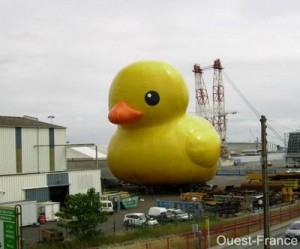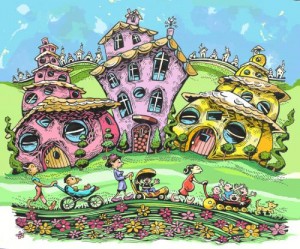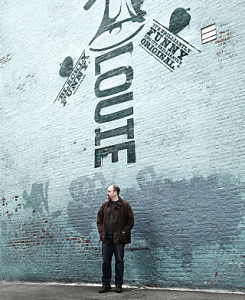
For the sequel: Moby-Duck takes Manhattan
In observance of the solemn occasion that is Father’s Day, the famed DadWagon interview turns its eye to Donovan Hohn, features editor at GQ and author of Moby-Duck, a book whose subtitle tells you much of what you need to know about it: The True Story of 28,800 Bath Toys Lost at Sea and of the Beachcombers, Oceanographers, Environmentalists, and Fools, Including the Author, Who Went in Search of Them.
What it doesn’t tell you is how much the book interests itself with the ideas of childhood, fatherhood, and the two pillars of contemporary parenting: anxiety and hope. It is a sweeping, smart, sentimental, funny, sad, hugely intelligent, and greatly moving book [and we say that because we mean it, and not because we think GQ should assign us to write highly-paid features about sexy Hollywood starlets–although they should.] We thought Donovan might bring some of his insight to the subjects we think about at DadWagon.
Perhaps my favorite aspect of your book had to do with the history of childhood and how concepts of what kids are has evolved over time. I’m going to include what I consider a great passage regarding that:
In the Middle Ages, when almost no one went to school, children were treated like miniature adults. At work and at play, there was little age-based segregation. “Everything was permitted in their presence,” according to one of Ariès’s sources, even “coarse language, scabrous actions and situations; they had heard everything and seen everything.” Power, not age, determined whether a person was treated like a child. Until the seventeenth century, the European idea of childhood “was bound up with the idea of dependence: the words ‘sons,’ ‘varlets,’ and ‘boys’ were also words in the vocabulary of feudal subordination. One could leave childhood only by leaving the state of dependence.” Our notion of childhood as a sheltered period of innocence begins to emerge with the modern education system, Ariès argues. As the period of economic dependence lengthened among the educated classes, so too did childhood. These days education and the puerility it entails often last well into one’s twenties, or longer.
Tell me: what do these changing ideas of childhood mean to you?
The spring I first came across the story of the bath toys lost at sea, the spring of 2005, I was about to become a father. And as you know, when that happens, you’re suddenly initiated into this weird new-parent subculture. You’re reading baby books, shopping for baby gear, visiting maternity wards. And the artifacts of that subculture suggested all sorts of confused, semi-articulate notions about childhood. So I started reading books like Huck’s Raft, a history of American childhood, or Philippe Ariès’s Centuries of Childhood. I suppose those books were my version of What to Expect When You’re Expecting. As I mention in the book, the Puritans saw children as wicked little beasts, born into sin. The romantics idealized them as little noble savages. For Victorians, there was a sentimental cult of purity and innocence. How did our parents see us? How do we see kids now? Those seemed like good questions. They still do. In part because I think our thoughts and feelings about childhood are for our generation unusually vexed.
“Unusually vexed”? How so?
The American divorce rate peaked in 1980. I don’t think that divorce is in itself a problem. Hell, in many cases—my parents’, for instance—it’s preferable to the alternative. But that 1981 peak is, I think, a meaningful indicator of how much domestic life was in turmoil in the Seventies. On the street where I grew up, it was like the spread of an infectious disease, the way families kept falling apart. Now as parents I think many of us who grew up then feel both a melancholy kind of nostalgia for the childish things of the Seventies and an acute wish to be better parents than our own parents were.
A radical shift in gears, if you don’t mind. What books are you reading to your kids? Any favorites? Ones you hate? Ones you wish they would like but they don’t? (My son won’t fall in love with Stuart Little no matter how hard I try.)
I read my older son Stuart Little a couple years ago, and he listened attentively, but I don’t think he fell for it. Then this spring he read it on his own, and loved it. That’s his big thing now: reading solo. He just got the hang of it and now can’t get enough of it. He’s also started making his way through the Roald Dahl books, and enjoying them as much as I hoped he would because it doesn’t get much better than Roald Dahl. We thought about trying Charlotte’s Web but decided he’s not ready for the death of Charlotte, who is after all a maternal figure. He’s terrified of mortality right now—his own, ours. (How do you explain death to a five-year-old? There’s a topic for DadWagon.) (Editor’s note: Way ahead of you.)
Beyond just kids’ books, what are your favorite books that include fatherhood as a theme? Do you see any similarities between them?
I think there’s a dearth of good portraits of fatherhood, at least by American writers. There are plenty of fathers, but they tend to be like Pap in Huck Finn. Or like Willy Loman. Or like Rabbit Angstrom in the Updike novels, fathers who wish they were still Huck. What are the exceptions? Actually, come to think of it, I suppose Jim in Huck Finn is an exception. McCarthy’s The Road comes to mind. You can add that to DadWagon’s what-made-me-cry-today thread: the end of The Road. Researching my own book, I stumbled on Rockwell Kent’s Wilderness: A Journal of Quiet Adventure, about the six months Kent lived alone on an Alaskan island with his nine-year-old son. Kent’s there to paint the landscape, but it’s his portrait of his daily life with his son that makes the book worth reading. There’s Richard Ford’s Independence Day. It occurs to me that all three of those books are about fathers as single parents. Not sure what to make of that. You know what novel is to an underappreciated degree about both fatherhood and motherhood? The Scarlet Letter. When I read it in high school, I hated it. When I read it after becoming a father, I loved it. People tend to think it’s a story about the forbidden love of Hester and Dimmesdale. But at the heart of the story is Pearl. She’s the catalyst in the plot who rewrites the meaning of the letter A (in seaweed) and reunites her parents, transforming both of them. I’d love to find more recent examples. Perhaps your readers will recommend some.
Children today get little opportunity for unsupervised play. What impact does that have on their imagination?
I have no idea what impact it has, but I do find myself wishing that my kids could spend as much time outside, on the loose, as I did. The best parts of my childhood were the unchaperoned hours outside. (Also the best part of Malick’s Tree of Life, by the way, which I mention mainly because it’s the first movie my wife and I have seen in a theater in two years, since our younger son was born.) Your question makes me think of this Isaac Babel story I love called “Awakening” about Babel’s childhood in Odessa. His parents in the story remind me of many New York parents. They make their boy take music lessons with a violin teacher named Mr. Zagursky, who runs “a factory that churned out child progidies.” But our hero is no prodigy. “Sounds scraped out of my violin like iron filings,” Babel writes. Instead of scores, he places on his music stand books by Turgenev and Dumas, reading them as he scrapes away. Eventually he starts playing hooky from Zagursky’s studio, sneaking off to the harbor, where he meets a man by the name of Smolich and begins a different sort of apprenticeship. Smolich teaches him to swim, and to pay attention. “‘What kind of bird is that singing?’” Smolich asks his young student one afternoon. “I couldn’t answer,” Babel writes. “The names of birds and trees, what families they belonged to, where the birds flew, on which side the sun rose, when the dew was at its heaviest—all this was unknown to me.” Smolich: “‘And you have the audacity to write? . . . Your landscapes resemble descriptions of stage sets. Goddamn it! What could your parents have been thinking of these past fourteen years?’”
Right now, people are talking about Go the F**k to Sleep. Pitch me your children’s book. I know you have one. Don’t worry, we won’t steal it.
Back in our twenties, in the Before Children Era, I used to make up bedtime stories to help my wife go to sleep, and there is one I think would make a good picture book. But I’m not ready to tell it, sorry. I have been thinking about the wild popularity of Andrew Mansbach’s Go the F**K to Sleep—which isn’t really a children’s book, of course. It reminds me of Louis C.K.’s comedy. Both give voice to the sort of thoughts parents usually try hard to keep private. I wonder if parenthood is, for many of us, the last great source of shame. I mean, it’s hard to be shocking about sex anymore. Or scatology. But your kids? My favorite line in the Mansbach book is the self-loathing one in which the speaker says, “I’m a crap parent.” Don’t we all think that sometimes? And sometimes, when we think that, it’s true. How could it not be?



